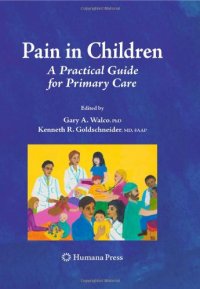
Ebook: Pain in Children: A Practical Guide for Primary Care
- Tags: Pediatrics, General Practice / Family Medicine, Internal Medicine, Neurology, Pain Medicine, Anesthesiology
- Year: 2008
- Publisher: Humana Press
- Edition: 1
- Language: English
- pdf
Advances over the past two decades have enabled physicians to revolutionize the manner in which they can assess and manage children’s pain. Thirty years ago it was thought that young children did not experience pain and therefore it was not necessary to treat it. Today professionals from a variety of disciplines have contributed data that have revolutionized medical perspectives. Technological advances now enable doctors to treat acute pain in fetuses, premature neonates, infants, toddlers, children, and adolescents with increasing precision and efficacy. Research highlighting the context of chronic pain has moved them away from a mind-body dichotomy and toward an integrated, holistic perspective that leads to substantial improvement in children’s adaptive functioning as well as subjective discomfort.
This book covers these topics and is intended for anyone who provides medical care to children. Each chapter provides an overview of the problem, followed by a "hands on" description of relevant assessment and intervention strategies. The role of the primary care practitioner is highlighted, both as a front-line resource as well as a consumer of specialized pediatric pain treatment services. Each chapter ends with a summary and specific bullet points highlighting the most central elements, making for quick and easy reference.
Advances over the past two decades have enabled physicians to revolutionize the manner in which they can assess and manage children’s pain. Thirty years ago it was thought that young children did not experience pain and therefore it was not necessary to treat it. Today professionals from a variety of disciplines have contributed data that have revolutionized medical perspectives. Technological advances now enable doctors to treat acute pain in fetuses, premature neonates, infants, toddlers, children, and adolescents with increasing precision and efficacy. Research highlighting the context of chronic pain has moved them away from a mind-body dichotomy and toward an integrated, holistic perspective that leads to substantial improvement in children’s adaptive functioning as well as subjective discomfort.
This book covers these topics and is intended for anyone who provides medical care to children. Each chapter provides an overview of the problem, followed by a ''hands on'' description of relevant assessment and intervention strategies. The role of the primary care practitioner is highlighted, both as a front-line resource as well as a consumer of specialized pediatric pain treatment services. Each chapter ends with a summary and specific bullet points highlighting the most central elements, making for quick and easy reference.